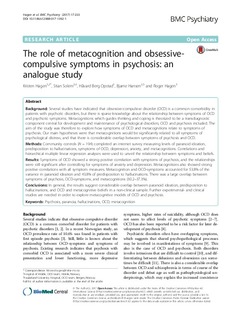| dc.contributor.author | Hagen, Kristen | |
| dc.contributor.author | Solem, Stian | |
| dc.contributor.author | Opstad, Håvard Berg | |
| dc.contributor.author | Hansen, Bjarne | |
| dc.contributor.author | Hagen, Roger | |
| dc.date.accessioned | 2018-06-07T09:25:35Z | |
| dc.date.available | 2018-06-07T09:25:35Z | |
| dc.date.created | 2017-07-15T20:41:40Z | |
| dc.date.issued | 2017 | |
| dc.identifier.citation | BMC Psychiatry. 2017, 17:233 1-8. | nb_NO |
| dc.identifier.issn | 1471-244X | |
| dc.identifier.uri | http://hdl.handle.net/11250/2500755 | |
| dc.description.abstract | Background: Several studies have indicated that obsessive-compulsive disorder (OCD) is a common comorbidity in patients with psychotic disorders, but there is sparse knowledge about the relationship between symptoms of OCD and psychotic symptoms. Metacognitions which guides thinking and coping is theorized to be a transdiagnostic component central for development and maintenance of psychological disorders, OCD and psychosis included. The aim of the study was therefore to explore how symptoms of OCD and metacognitions relate to symptoms of psychosis. Our main hypotheses were that metacognitions would be significantly related to all symptoms of psychological distress, and that there is considerable overlap between symptoms of psychosis and OCD. Methods: Community controls (N = 194) completed an internet survey measuring levels of paranoid ideation, predisposition to hallucinations, symptoms of OCD, depression, anxiety, and metacognitions. Correlations and hierarchical multiple linear regression analyses were used to unveil the relationship between symptoms and beliefs. Results: Symptoms of OCD showed a strong positive correlation with symptoms of psychosis, and the relationships were still significant after controlling for symptoms of anxiety and depression. Metacognitions also showed strong positive correlations with all symptom measures. Metacognition and OCD-symptoms accounted for 53.8% of the variance in paranoid ideation and 43.8% of predisposition to hallucinations. There was a large overlap between symptoms of psychosis, OCD-symptoms, and metacognitions (30.2–37.3%). Conclusions: In general, the results suggest considerable overlap between paranoid ideation, predisposition to hallucinations, and OCD and metacognitive beliefs in a non-clinical sample. Further experimental- and clinical studies are needed in order to explore metacognitive models of OCD and psychosis. | nb_NO |
| dc.language.iso | eng | nb_NO |
| dc.publisher | Springer Nature | nb_NO |
| dc.rights | Navngivelse 4.0 Internasjonal | * |
| dc.rights.uri | http://creativecommons.org/licenses/by/4.0/deed.no | * |
| dc.title | The role of metacognition and obsessive-compulsive symptoms in psychosis: An analogue study | nb_NO |
| dc.type | Journal article | nb_NO |
| dc.type | Peer reviewed | nb_NO |
| dc.description.version | publishedVersion | nb_NO |
| dc.source.pagenumber | 1-8 | nb_NO |
| dc.source.volume | 17:233 | nb_NO |
| dc.source.journal | BMC Psychiatry | nb_NO |
| dc.identifier.doi | 10.1186/s12888-017-1392-1 | |
| dc.identifier.cristin | 1482338 | |
| dc.description.localcode | © The Author(s). 2017 Open Access This article is distributed under the terms of the Creative Commons Attribution 4.0 International License (http://creativecommons.org/licenses/by/4.0/), which permits unrestricted use, distribution, and reproduction in any medium, provided you give appropriate credit to the original author(s) and the source, provide a link to the Creative Commons license, and indicate if changes were made. The Creative Commons Public Domain Dedication waiver (http://creativecommons.org/publicdomain/zero/1.0/) applies to the data made available in this article, unless otherwise stated. | nb_NO |
| cristin.unitcode | 194,67,40,0 | |
| cristin.unitname | Institutt for psykologi | |
| cristin.ispublished | true | |
| cristin.fulltext | original | |
| cristin.qualitycode | 1 | |

